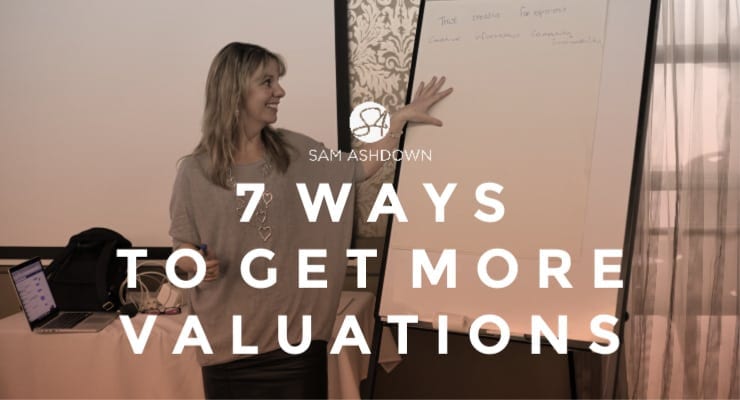7 Ways to Get More Valuations
How to get through more doors, more often. Marketing advice for estate and letting agents that actually works, from Sam Ashdown.
Too long: didn’t read? Skip to the bottom and see all 7
It’s so frustrating, isn’t it, when you see a great property launched to market and you didn’t even get invited to value? So what can you do to make sure that when a vendor is thinking about selling, they call you too?! Here are my best seven tactics to make sure that you get that call:
-
Be everywhere
Vendors and landlords are elusive. They hide, never respond to any of your canvassing efforts, then they call you when they have probably 90% already decided which agent to instruct, using your valuation to make up the numbers.
The trick is to reach them much earlier in their selling journey. Before they even realise they want to sell, in fact. And the only way to do that, is to start a conversation with them, wherever they like to spend their time.
Social media is where more and more people like to hang out. They sit on the sofa, watching Downtown Abbey or Strictly, sipping Shiraz and browsing on their iPads or smartphones. They are on Pinterest, Facebook, Twitter, Google Plus, YouTube….. the list is endless.
So where should you focus your efforts?
Everywhere that they are!
It’s not easy, and if you’re a social media newbie, ignore this advice right now and concentrate on just one or two platforms, until you work out what on earth you’re supposed to be doing.
Once you are a little more skilled however, it’s time to reach out to your vendors and landlords, connecting with them before they are ready to book a valuation.
Try these five steps to rolling out a successful ‘be everywhere’ social strategy:
1. Look at your previous 20 vendors, and make a list of the social media platforms they are most likely to use. Better still, ask them.
2. Make sure you have an account on each of those platforms
3. Start spending 10 minutes a day on each platform, working out the dynamics, culture and etiquette.
4. Set a theme for each month, e.g. home strategies, Rightmove strategies, photography, and then plan some great content for each platform, based on your theme. If you blog (and you should) then this can be the basis for your updates for each platform.
5. Ask for help from your team, creating a Google doc or similar for everyone to be able to add their finds and ideas to.
Of course, we shouldn’t neglect our offline activities, so here are five suggestions to make sure you’re also ‘everywhere’ in your local area:
1. Sponsor community events, teams and causes. Local football teams, school fairs, or even social causes like litterpicks. Whatever is going on that matters to the folk in your community, try to get your name associated with it.
2. Take stands and exhibit at farmers’ markets, summer or winter fairs, county shows – whatever you can find. The smaller ones usually cost next to nothing (from £30 for a local community fair). Plan it well in advance and don’t try to sell properties – just use it as a platform for brand recognition and to give you the opportunity to actually talk to people.
3. Keep canvassing – make it regular with a creative message and strong call to action. Create a canvassing calendar at the beginning of the year, and aim to make sure every target property in your locality receives at least 4-6 canvassing pieces throughout the year. Remember, it’s better to send three pieces to one house, than one piece to three properties.
4. Run local competitions. Best promoted with social media for a wider reach, these are a great way of taking online relationships offline, and start to really get to know your community. Try treasure hunts using your for sale boards, local photography competitions, or even things like ‘best front garden’ competitions. Make it interesting, and the local press will cover it. Free publicity!
5. Hold events yourself – free information evenings can work really well to get you in front of vendors or landlords. Invite some local experts to speak too, and encourage competitors’ clients by sending invites to boards!
-
Get found for the right reasons
Have you tried Googling your company name recently? Do you ‘own’ the first page? What about the names of your key members of staff? After all, that’s what many of your prospective clients may well be doing. Being aware of the information about your company that is available online is half the battle. The other half is damage limitation and making sure that all new searchable information is positive and professional.
Take these steps to make sure you’re protecting your brand in all the right places. When I Google ‘Sam Ashdown’, I pretty much own the first two pages or so.
Guest Blogs – now I write quite a few regular blogs for industry publications, like Estate Agent Networking, so these show up in my search results. Interestingly, and probably because of their visitor numbers (ie higher than mine), my guest blog results show higher than my own blog. There’s a lesson there – get guest blogging!
Images – if you have an unusual name, you should find that the images returned in your search are you! If you have a generic name, like John Smith, it will be nearly impossible to ‘own’ these results. The more common your name, the more important it becomes to get your photograph out there as much as you can, and make sure not only have you named it as you, but that everywhere you can do, you add ‘alt tags’ – in other words, you tag it with your name and company brand too.
LinkedIn – the result here will be a generic LinkedIn one, as Google can’t see ‘inside’ LinkedIn; you have to be logged in first. I have discovered though, that the more active I am on LinkedIn, the more search results are returned for me, giving searchers the chance to click on several different links to find my profile.
Facebook – again, this is ‘gated content’ – Google can’t see the search results within Facebook. If you have an active page you may well be listed here, with a link to a log-in page for the user.
So as you can see, getting found on Google is so much more than SEO (Search Engine Optimisation). It requires a comprehensive strategy of making sure your name and brand – and photo – appear in all the right places.
-
Motivate your vendors
I’m not suggesting you offer discounts, but instead instilling in your prospective customers a sense of urgency to encourage them to call you now, and not at some vague time in the future, risking a competitor luring them away in between. Educate them about the best times of the year to sell their home, the best day of the week and also the right time for the current market conditions.
Incentives come in many forms; not just monetary. Try these ideas as time-limited motivators to get that signature now, instead of later:
- A complimentary consultation with a home stager can have a win-win outcome – the better the property looks, the quicker it will sell! Also, with the best will in the world, you probably don’t have the skill – or sensitivity – to be a home stager, so leave it to a professional to do the job right.
- How about professional photography at your expense? If you have a good deal with a local photographer, this could cost you as little as £150 – a lot cheaper than dropping your fee.
- Think about what your vendor actually needs. Window cleaning? Gardening? Or even the services of a handyman?
Keep the benefits in kind, not monetary, and they will feel worth all the more for it.
Another strategy to get vendors on board, is to offer a specific timeline to get them thinking about their move. Something like “Instruct us by 1 October and be in your new home by Christmas” can be really powerful. Or keep it selective, like “Only 2 places left on our 30 Day Sale Challenge” – intriguing as well as effective!
Finally, make sure your vendors are motivated. I spoke to a lady recently who lives in a lovely home; she’s just a bit bored of it. When I asked here where she’s moving to, she told me she hadn’t yet decided. I realised she was going to really struggle to sell. If there’s no ‘push’ out of an unsuitable property, and no ‘pull’ into a dream home, then where is the incentive for that vendor to move? They will no doubt ‘test’ the market at too high an asking price, then refuse sensible offers. You could have the house on your books for months, or even years.
Be selective, and don’t take on unmotivated vendors; you’ll only regret it long term.
-
Do the donkey work
My dad had a tie embossed with the following initials – YCDBSOYA. He’d nicked the idea from Jack Cohen – aka Mr Tesco – who had the same initials embossed on tiepins that he gave out to his senior staff, telling them that it was an old Yiddish saying.
But it wasn’t. It stands for:
You can’t do business sat on your a***e
You see, being a successful estate agent isn’t about staring at a screen from morning till night. Even in this online, digital world, you still need to wear out the shoe leather. Prospecting for new business can’t all be done online – you need to hand-deliver canvassing cards, identify ‘poaching’ opportunities and actually speak to local home owners. Even MPs still pound the streets before elections, so think of it as if you’re trying to win a campaign – which you are!
People buy people, not brands. If all your vendors ever see is your logo plastered on your car and sale boards, then when you turn up to that next valuation, it will be an ice cold lead. You want to warm those leads up, to be able to say when they answer the door, “Oh, we know each other from xxx”. Straight away, the temperature will rise and you won’t feel the need to try to sell yourself. The visit will just take the form of a natural conversation as if it were between friends. Trust has to be earned, and a vendor won’t instruct someone she doesn’t trust. If you are already a familiar face, you’ve taken the first step on the trust ladder. Not to mention the fact that if she sees you around at the school, a networking meeting or local club, she knows you have a local ‘accountability’, reassuring her that you’ll do a great job of selling her home.
So – get off your… behind, and go meet some people.
-
Be transparent
So, we know that people buy people, and vendors need to know, like and trust you before they will instruct you. So how do you show what an honest, lovely person you are before you ever meet in person?
The easiest way to demonstrate your personality and start to build liking and trust, is via social media, and specifically blogging. If a prospective vendor has been reading your blog for a while, and at the same time keeping up with your Facebook page or Twitter feed, they will get a feeling for your ethos and company values.
They will start to see what you stand for, and ascertain whether or not your opinions are in line with their own.
Here are some ideas to demonstrate transparency:
- Blog – it’s a fabulous platform to unpack issues, educate your community, and position yourself as an expert in your field. You can set up a blog in minutes, on a free platform like Blogger and just practice until you feel able to let the world know you are a blogger and move your posts to your website.
- Facebook – treat it as if it were a live website, which it kind of is. You wouldn’t want to update your website every time you participate in Movember, or a charity fun run, but you can easily add some photos to your Facebook page. Keep it chatty, relevant and don’t use it to sell properties – that’s what Rightmove is for.
- Twitter – considering that each tweet is less than 140 characters, it’s amazing the depth of the conversations you can actually have on Twitter! It’s a fantastic platform for engaging with local people, and as more and more local businesses are turning to Twitter for leads and information, you could be missing out massively if you don’t participate.
- Print articles – don’t advertise properties, but instead fill your ad space with advice. Target vendors and landlords with the wisdom of your valuable advice and information and your page will become a ‘must read’ for anyone thinking of selling or renting their property.
The more a vendor or landlord knows about you in advance, the more likely they are to book a valuation with you, and not the shiny new agent down the road. Once they discover that you are just as they imagined and expected, they will find it much easier to place their trust in your ability to sell their home.
-
Be different – and prove it
Don’t criticise the competition; if you really can’t say anything good about them, don’t say anything at all. Better though if you can ‘damn them with faint praise’ by saying something like “I hear they are really good at selling flats” (but only if you’re not trying to sign up a flat owner, obviously!).
I spoke to an agent recently who told me that in his town of 6 agents, he was truly different. “How are you different?” I asked.
He went on to tell me that every other agent in his town was open until 5.30pm.
“When are you open until?”
“6pm!” he answered with relish, clearly very pleased with himself.
“That’s not different”, I told him. “That’s longer”.
The trouble with longer, is that it can be copied. Before you know it, you’ll be opening until 9pm, 10pm: where will it all end? Will you be taking a camp bed into work because you aren’t close?
Differentiation is about thinking differently.
Instead of trying to open longer than the competition, or having bigger window displays, or booking more pages in the paper, you need to differentiate intelligently.
Use your vendors as a filter to help you work out your differentiators, because they need to be things that your vendors will truly value and appreciate.
Very few vendors will appreciate if you have two more pages in the paper than your competitors, but they may actually really value a free home stager visit, or a complimentary garden tidy every couple of weeks. Would they like a free sellers’ clinic once a month, when they can drop into your office and ask questions about their sale, even if they are not yet your vendors? Or perhaps what they would really value is some help project managing replacing their dated bathroom?
-
Create a community hub
Facebook groups give you a fantastic opportunity to create a community hub. Make them theplaces to go to find out about local events and information, and locals in their droves will come to your pages.
Try posting about:
- Farmers’ markets
- School fairs
- Local celebrities
- Topical issues
- Local debates and controversies (try to stay as neutral as possible)
- Interesting properties (not just yours)
- Links to local businesses’ websites
- Networking events
- Courses and workshops
And the list goes on. The agents I know who are adopting this ‘community’ tone on their Facebook pages have currently around 6,000 likes – the ones who are just listing properties and links to the latest RICS surveys are struggling to get past a couple of hundred.
Where do you want to be?
Keep your pages fresh, updated and topical with lots of quality information and advice and even I will like it!
Getting every valuation is all about how your brand is perceived in your neighbourhood. If it is synonymous with expert advice, an open approach and a hard working attitude, the valuations will roll in. Then all you need to do is convert them. Easy….
In a nutshell – 7 ways to get more valuations:
- Be everywhere
- Get found online for the right reasons
- Motivate your vendors
- Be different, and prove it
- Be transparent
- Do the donkey work
- Create a community hub
Would you like a free 20 minute website review? I just have a handful of spots to offer this month, so if you’d like to know what tweaks you could make to your website to get through more doors, just answer a few questions here and we’ll get your 20 minute website review booked in.









